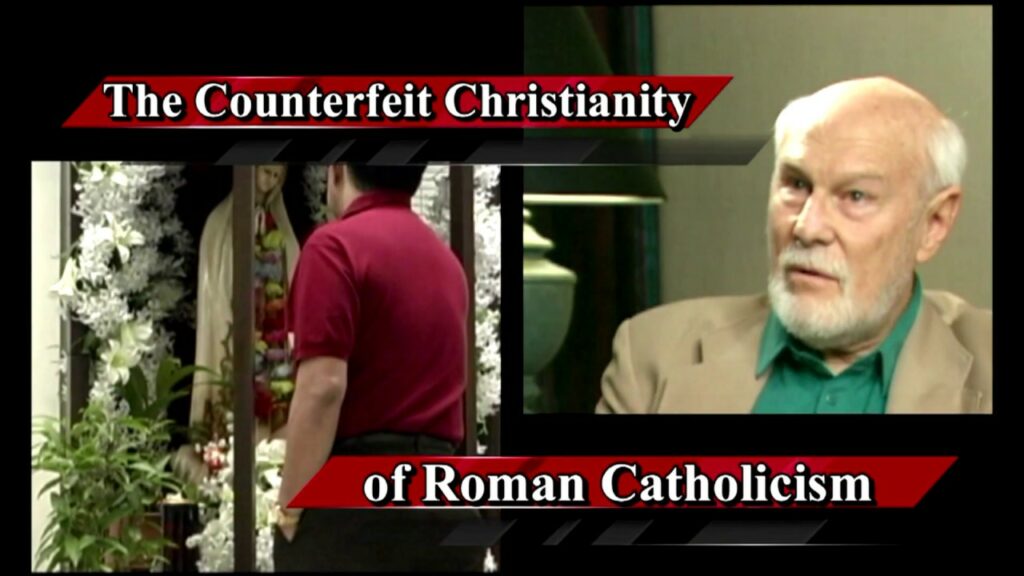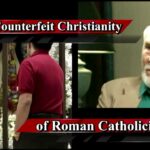
As I’ve preached and ministered in different areas, I’ve had the opportunity to have some great interactions with Roman Catholics. During several of these conversations, I noticed the same pressing issue resurface: It may be articulated differently, but they usually say something about having conflicting thoughts or confusion about their Catholic faith. They often have the same question many others do: How can I be saved for eternity? I want to move past the manmade confusion and contradictions about salvation and point you to the hope and eternal security found in the Jesus of the Bible.
For this article, when I use the word Catholic, I’m referring to Roman Catholics and the Roman Catholic Church. I have Catholic friends who are some of the kindest people I know. I have family members who are former Catholics. Believe it or not, I occasionally enjoy listening to Catholic radio, not as a fault finder, heresy hunter, or for entertainment, but as a born-again Christian who is genuinely interested in what Catholics believe and why. If I named some well-known personalities from Catholic radio I listen to, you’d easily recognize them. The point is that I’m not against Catholic people or anti-Catholic, but I am certainly opposed to the false teachings and spiritual deception of the Roman Catholic Church.
I’ve had plenty of opportunities for spirited debate and agreeing to disagree with Catholics. The problem is that well-intentioned people want to focus on what is generally framed as evangelical, fundamentalist, or Protestant objections. Some people become pseudo-Catholic apologists trying to prove they are correct, just as some Protestants do. They focus on arguments about Mary, purgatory, Saints, councils, Papal authority, and traditions. That’s not to imply that differing views on these subjects aren’t vitally important because they certainly are. But they all generally point to the spiritual elephant in the room of every Catholic and Protestant; It’s the subject of salvation and how to obtain it.
There are numerous differences between what the Roman Catholic Church teaches and what the Bible says about salvation. It becomes patently one-sided when proof texts are used, Bible verses are taught out of context, and manmade traditions usurp the simple gospel. On one side of the scale is God’s unchanging word, the Bible. On the opposite side of the scale are the Bible, the traditions of the Roman Catholic Church, and the living magisterium, the Pope, in communion with the Bishops, along with the Eucharistic Jesus, who is a different one that the Bible warns about Matthew 24:26.
The space in this article doesn’t allow me to document the numerous differences between what Catholic tradition teaches about salvation and what the Bible clearly states. I will cover a few of the glaring unbiblical differences between the works-based salvation through observing the sacraments of baptism, penance, and the Eucharist instead of the free gift of salvation by grace through faith in Jesus.
First, on page 320 of the Catechism, regarding the “necessity of baptism,” it states: By baptism, all sins are forgiven. This contradicts what the apostle Paul said about the forgiveness of sins in Ephesians 1:7. A Catholic should ask: Who will I believe, the Vatican or the Bible?
Second, The Catechism teaches that salvation comes through the sacrament of penance. Page 367, paragraph 1460 states: It (the penance) must correspond with the nature and gravity of the sins committed. It can consist of prayer, offerings, works of mercy, service of neighbor, voluntary self-denial, sacrifices, and the patient acceptance of the cross we must bear. Regarding penance, paragraph 1461 states: Indeed, bishops and priests, by virtue of the sacrament of holy orders, have the power to forgive all sins.
The manmade tradition that we must work according to the nature and gravity of our sins to be forgiven contradicts Ephesians 2:8-9. It contradicts Jesus’ words on the cross when He said, “It is finished.” The Catechism states that bishops and priests can forgive all sins, but the Bible demonstrates that God alone forgives sins. Mark 2:7, Luke 5:21, and 1 Timothy 2:5. Catholics should ask: Who is correct, the Vatican or the Bible?
Third, the Catechism states: The Eucharist is also offered as a sacrifice in reparation for the sins of the living and the dead and to obtain spiritual or temporal benefits from God. It is called the Holy Sacrifice because it makes present the one sacrifice of Christ the Savior and includes the Church’s offering. Regarding the Eucharist, the Catechism also says: The sacrifice of Christ and the sacrifice of the Eucharist are one single sacrifice: “The victim is one and the same: the same now offers through the ministry of priests, who then offered himself on the cross; only the manner of offering is different.” “And since in this divine sacrifice which is celebrated in the Mass, the same Christ who offered himself once in a bloody manner on the altar of the cross is contained and is offered in an unbloody manner… this sacrifice is truly propitiatory.”
Is Jesus being sacrificed repeatedly at every Mass as taught in the Catechism, or did Jesus die “once for all” as the Bible says in Hebrews 10:10-14? Catholics should ask: Is the Vatican correct, or should I trust God’s word?
One of the main concerns Catholics have is knowing for sure that they are going to heaven, or, to put it another way, am I saved? Many Catholics aren’t sure they are going to heaven, and I’ve heard this articulated from former Catholics and fellow Bible teachers. The sentiment is the same and centered on a dear Roman Catholic person holding their rosary beads, believing in a false Eucharistic Christ (a different Jesus), and wondering if they will have to atone for their sins in purgatory, Catechism page 268-269, paragraphs 1030-1032.
But the Bible teaches Purgatory can’t expiate sins; only a blood sacrifice can. Hebrews 9:22. Jesus said, It is finished, so you don’t have to trust in the false Eucharistic Christ, only in the true Jesus of the Bible, Matthew 27:45-46 and John 19:30. The Catholic Church teaches: If anyone says that the sacraments of the New Law are not necessary unto salvation, but superfluous; and that, without them, or without the desire thereof, men obtain of God, through faith alone, the grace of justification;-though all (the sacraments) are not indeed necessary for every individual; let him be anathema.
This contradicts the words of Jesus in one of the most well-known verses in the Bible, John 3:16.
If you are a Catholic, please consider the simplicity of the gospel. Today, you can be saved for eternity if you put your faith in Jesus, not in traditions or a manmade church. If we come to Him with a sincere, contrite heart, He will forgive us. The Bible says to repent, which means confessing your sins and changing your direction. It’s a change of mind; God’s right, and I was wrong. Romans 10:9-10 tells us how to become born again and be saved.
Will you consider what I’ve written in this article? I’ve made every effort to lay my personal opinions aside and compare what the Bible says about salvation to what the Roman Catholic Church teaches. Jesus is coming soon, and God’s wrath will fall upon everyone who doesn’t know Him, religious or not. Please come to faith in the Jesus of the Bible while there’s still time. If you do, you can have peace knowing that you have fellowship with Him here and will spend eternity in heaven with Him: no uncertainty, continual guilt, or worry that you haven’t done enough to make it to heaven.
Dear Catholic friends, If you have questions about the differences between what the Roman Catholic Church teaches and what the Bible teaches and want further information, I’ve included several solid biblical links below the article. If you decide to come to saving faith in Jesus today, I’d love to hear from you! Please write to us so we can praise God with you for your new life in Him. Please find a Christ-honoring Bible-centered church. If you are a Roman Catholic who has just come to saving faith in Jesus, here’s timely biblical encouragement in your new walk with Jesus:
“It is possible that there are some Catholics who are my brothers and sisters and have come to faith in Christ. When they do, they come into a deep conflict between what they now know is the truth of the word of God and what the Catholic Church teaches. They don’t want to leave because of family, friends, and this has been their life, but they can’t stay.” — Dave Hunt -The Berean Call
All for Him,
Howard
Resources of hope for the Catholic heart:
Podcast episode: Hope for the Roman Catholic Heart, click here
Video by Dave Hunt: The Counterfeit Christianity of Roman Catholicism, click here
Book by Roger Oakland: Another Jesus? The eucharistic christ and new evangelization, click here
Video by Dr. John Barnett: Why I’m not a Roman Catholic, click here
Video by Jan Markell and Mike Gendron: Unity With Babylon, click here
The post Hope for the Roman Catholic Heart :: By Howard Green appeared first on Rapture Ready.


Comments